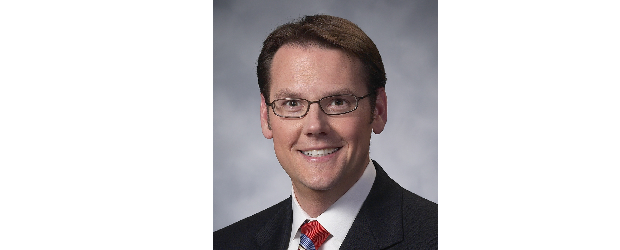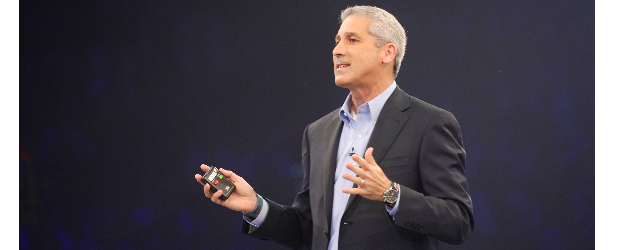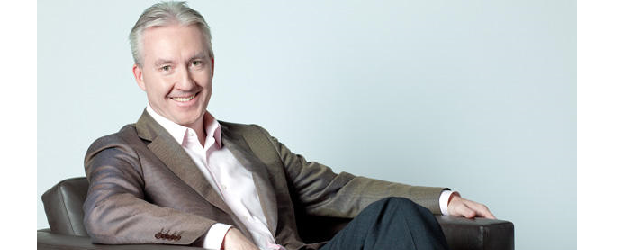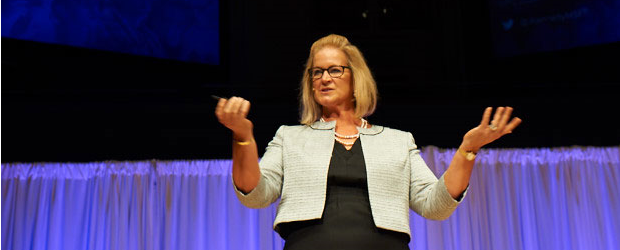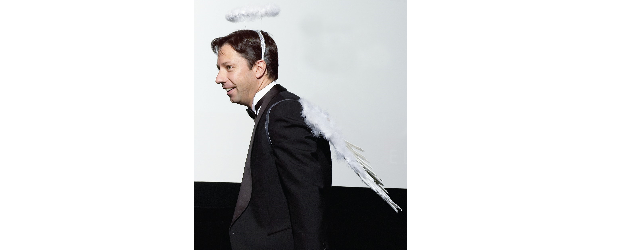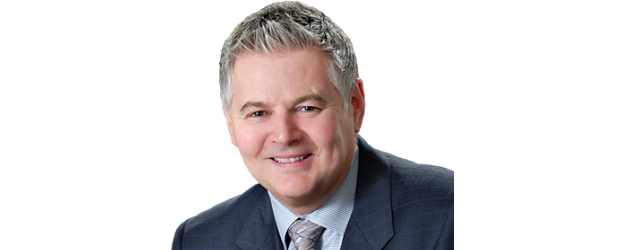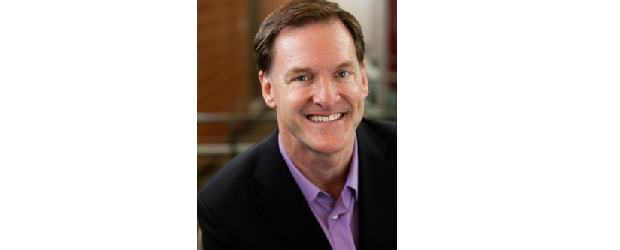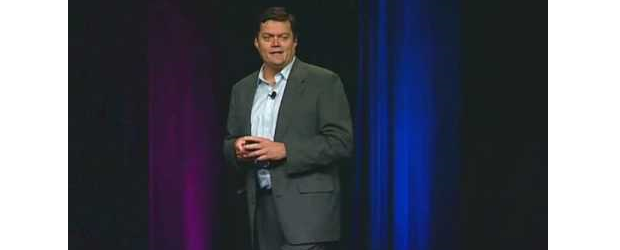Jan. 2000 – Jan. 2005
Frank Clegg returned to the President’s role of Microsoft Canada and his encore performance was as good if not better than his first.
He cut the ribbon on a state of the art home office in Mississauga, Ont. While that was a great achievement, he followed that up by introduced trustworthy computing, Microsoft CRM, Small Business Server and a new Office System.
Clegg estimates to CDN at the time that there are 80,000 people in Canada who earn their living with Microsoft.
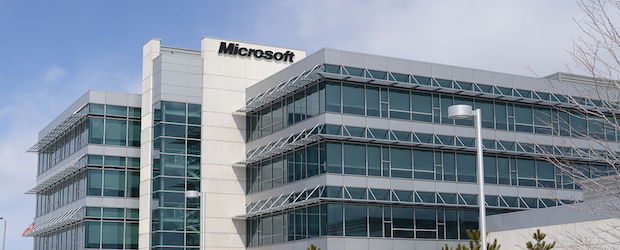 The house that Clegg built. Microsoft Canada’s head office in Mississauga, Ont.
The house that Clegg built. Microsoft Canada’s head office in Mississauga, Ont.
Nov. 2004 – Feb. 2006
“Best job I ever had,” that was David Hemler’s statement after leaving Microsoft Canada. He was Frank Clegg’s hand pick successor. Clegg told CDN at the time that he wanted a Canadian to run Microsoft Canada but no one was ready yet even thought there were several great candidates. So Hemler, a Minnesota native, took over the sixth largest subsidiary in all of Microsoft.
Hemler was on hand for the 20th anniversary launch of Windows. He also oversaw the Canadian release of Microsoft SQL Server 2005, Dynamics GP and CRM 3.0. Hemler had to leave Canada suddenly to go back the U.S. to help an ailing family member.
Dec. 2005 – June 2009
One of the best stories about Phil Sorgen is how he got to Canada. Sorgen decided to fly his family into Toronto from their home in Seattle, but he instead drove more than 4,000 kilometres in over two days so that the family dog could have a comfortable journey. While in Canada, Sorgen made a concerted effort to deepen the company’s roots in the community. Sorgen spearheaded the CAN>WIN Summit and supported efforts such as working with children’s hospitals. He launched the Child Life Interactive Computers for Kids. Sorgen championed online safety initiatives such as Take Back the Net.
Sorgen returned to the U.S. and eventually was promoted to Worldwide Channel Chief.
July 2009 – June 2012
Arguable the most loved leader at Microsoft Canada. His departure was universally disliked throughout the channel community in Canada. Similar to Witts, Gales is from London, UK and loved Canada so much he became a citizen.
Gales ushered in Microsoft’s Software+Services cloud business to Canada as well as Microsoft Office 2010 and Windows Phone 7. He also campaigned long and hard to bring a Microsoft retail store to Canada and spearheaded the drive to return the Microsoft Worldwide Partner Conference, now called Inspire, to Toronto.
Since leaving Microsoft Canada, Gales was the country manager for VMware Canada and then became the country manager of AWS Canada.
July 2012 – Oct. 2013
Max Long became the third British-born executive to run Microsoft Canada. He was known as an avid ironman competitor and became responsible for all Microsoft operations across Canada including Retail, small/medium/large customers, professional and support services and across all different partner types.
He hosted the channel world at the 2012 Microsoft Worldwide Partner Conference in Toronto and was on hand to open the first Microsoft Store in Toronto. Long also launched Office-as-a-Service in Canada. He left the Canadian operation in August of 2013 to go back to Seattle for family reasons. He would still run Microsoft Canada until Sept. 30th of that year, while the company searched for a new Canadian leader.
Oct. 2013 – Sept. 2017
Janet Kennedy turned around the fortunes of Microsoft Canada. In her four-year term, Kennedy brought in two major data centres for the Canadian market. She also delivered new cloud and mobility solutions for the mass market and SMB. Early on in her tenure she recognized that Canada had tremendous IT talent but was lacking resources so Kennedy then put in place a $100,000 fund to support them. She too hosted the channel world at the 2016 Microsoft Worldwide Partner conference in Toronto.
In her last act, Kennedy presided over a massive re-org for the Canadian operation that included the new One Commercial Partner group.
Sept. 2017
The long time President of Dell Canada becomes the 10th President of Microsoft Canada and first Canadian-born executive since Frank Clegg.
Peesker became Dell Canada’s first ever President in 2013 after a four-year stint working for Dell in Ireland. Peesker spearheaded Dell Canada’s move to the channel nine years ago. He famously wore angel wings and a halo at the 2008 CDN Top 100 Solution Providers Gala to signal Dell’s commitment to the channel community in Canada.
Kevin Peesker has started his first week as the President of Microsoft Canada. He is the first Canadian-born leader of Microsoft Canada since 2004 when Frank Clegg retired. Peesker is the 10th President in the history of Microsoft Canada. If you don’t count the brief interim period in 1997 when David Wright took over before Simon Witts was named the new president.
CDN decided it would be interesting to take a look back at the eight men and two women who held this prestigious post in the Canadian IT industry.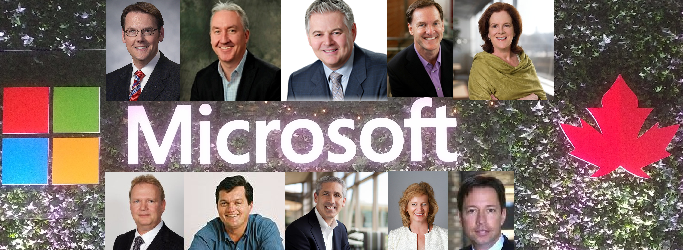
August 1986 – August of 1990
There was a Microsoft Canada before 1986 but the software giant named Malcolm MacTaggart as its first ever leader during the summer of 1986. He is credited with building Microsoft Canada from scratch as the company’s first office was above a Golden Griddle pancake restaurant. From there he established six regional offices and took Microsoft nationwide.
After Microsoft Canada, MacTaggart was the long time President and CEO of CryptoCard, a start-up that he turned into a multi-million dollar computer security provider. He also started the Spark Angel Investment Network.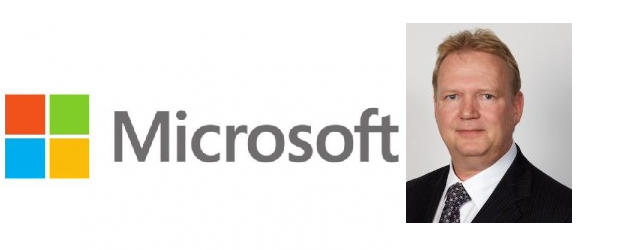
August 1990 – December 1991
Easily the most famous executive to run Microsoft Canada. As the story goes, Patty Stonesifer was spotted by Bill Gates and immediately hired to run Microsoft Canada. She was only in Canada for a little over a year and left to have a brilliant career. Stonesifer built the world’s largest foundation; the Bill & Melinda Gates Foundation ($38.7 billion endowment fund). She also spearheaded the creation of the Gates Library Foundation.
In her decade long tenure at the foundation, Stonesifer distributed more than $2 billion a year to help people and organizations improve their health and well-being. She is also the volunteer President and CEO of Martha’s Table, a non-profit founded by Gates to help children and families to build a better future for them.
Stonesifer also became the Lead Director of the corporate board of Amazon.com. She is also Vice Chair of the board of the National Museum of African American History and Culture.
January 1991 – May 1996
Frank Clegg’s first time in office was a resounding success. Clegg spent more than 14 years of his career – in some capacity – running Microsoft Canada. But he did it in two separate five plus year terms starting in 1991. In his first term, he launched Windows 3.0 and followed that up by joining five separate products into the Microsoft Office Suite.
Clegg grew Microsoft Canada from 90 people and $40 million in revenue in 1991 to more than 700 employees and surpassing the $1.2 billion mark by the time he retired in 2005.
During this five-plus year stretch, Clegg captured the President’s award every year. Clegg was promoted by Bill Gates to run the Central U.S. region as well as retain the post of Vice President of Canada.
More on Frank Clegg later on in this slideshow.
June 1996 – Sept. 1997
Jeff Dossett joined Microsoft in 1991 as the director of sales and took over for Frank Clegg after he was promoted to run the U.S. Central Region. His time at the top did not last long as in 1997, he was promoted to the role of GM of the Internet Customer Unit and needed to transfer Microsoft’ s Redmond, Wash. headquarters.
Sept. 1997 – Jan. 2000
The London, UK-born Simon Witts took a liking to Canada and decided to settle down in North Toronto. He was promoted to run Microsoft EMEA in 2000. That job was based in Paris but was soon promoted again to become essentially the worldwide partner chief for the software giant and returned to Canada even though that job was based in Redmond, Wash. The company then tacked on the Enterprise role which works with partners to sell to Microsoft’s largest global customers. He worked there for eight years until he left the company in 2011.
Jan. 2000 – Jan. 2005
Frank Clegg returned to the President’s role of Microsoft Canada and his encore performance was as good if not better than his first.
He cut the ribbon on a state of the art home office in Mississauga, Ont. While that was a great achievement, he followed that up by introduced trustworthy computing, Microsoft CRM, Small Business Server and a new Office System.
Clegg estimates to CDN at the time that there are 80,000 people in Canada who earn their living with Microsoft.
 The house that Clegg built. Microsoft Canada’s head office in Mississauga, Ont.
The house that Clegg built. Microsoft Canada’s head office in Mississauga, Ont.
Nov. 2004 – Feb. 2006
“Best job I ever had,” that was David Hemler’s statement after leaving Microsoft Canada. He was Frank Clegg’s hand pick successor. Clegg told CDN at the time that he wanted a Canadian to run Microsoft Canada but no one was ready yet even thought there were several great candidates. So Hemler, a Minnesota native, took over the sixth largest subsidiary in all of Microsoft.
Hemler was on hand for the 20th anniversary launch of Windows. He also oversaw the Canadian release of Microsoft SQL Server 2005, Dynamics GP and CRM 3.0. Hemler had to leave Canada suddenly to go back the U.S. to help an ailing family member.
Dec. 2005 – June 2009
One of the best stories about Phil Sorgen is how he got to Canada. Sorgen decided to fly his family into Toronto from their home in Seattle, but he instead drove more than 4,000 kilometres in over two days so that the family dog could have a comfortable journey. While in Canada, Sorgen made a concerted effort to deepen the company’s roots in the community. Sorgen spearheaded the CAN>WIN Summit and supported efforts such as working with children’s hospitals. He launched the Child Life Interactive Computers for Kids. Sorgen championed online safety initiatives such as Take Back the Net.
Sorgen returned to the U.S. and eventually was promoted to Worldwide Channel Chief.
July 2009 – June 2012
Arguable the most loved leader at Microsoft Canada. His departure was universally disliked throughout the channel community in Canada. Similar to Witts, Gales is from London, UK and loved Canada so much he became a citizen.
Gales ushered in Microsoft’s Software+Services cloud business to Canada as well as Microsoft Office 2010 and Windows Phone 7. He also campaigned long and hard to bring a Microsoft retail store to Canada and spearheaded the drive to return the Microsoft Worldwide Partner Conference, now called Inspire, to Toronto.
Since leaving Microsoft Canada, Gales was the country manager for VMware Canada and then became the country manager of AWS Canada.
July 2012 – Oct. 2013
Max Long became the third British-born executive to run Microsoft Canada. He was known as an avid ironman competitor and became responsible for all Microsoft operations across Canada including Retail, small/medium/large customers, professional and support services and across all different partner types.
He hosted the channel world at the 2012 Microsoft Worldwide Partner Conference in Toronto and was on hand to open the first Microsoft Store in Toronto. Long also launched Office-as-a-Service in Canada. He left the Canadian operation in August of 2013 to go back to Seattle for family reasons. He would still run Microsoft Canada until Sept. 30th of that year, while the company searched for a new Canadian leader.
Oct. 2013 – Sept. 2017
Janet Kennedy turned around the fortunes of Microsoft Canada. In her four-year term, Kennedy brought in two major data centres for the Canadian market. She also delivered new cloud and mobility solutions for the mass market and SMB. Early on in her tenure she recognized that Canada had tremendous IT talent but was lacking resources so Kennedy then put in place a $100,000 fund to support them. She too hosted the channel world at the 2016 Microsoft Worldwide Partner conference in Toronto.
In her last act, Kennedy presided over a massive re-org for the Canadian operation that included the new One Commercial Partner group.
Sept. 2017
The long time President of Dell Canada becomes the 10th President of Microsoft Canada and first Canadian-born executive since Frank Clegg.
Peesker became Dell Canada’s first ever President in 2013 after a four-year stint working for Dell in Ireland. Peesker spearheaded Dell Canada’s move to the channel nine years ago. He famously wore angel wings and a halo at the 2008 CDN Top 100 Solution Providers Gala to signal Dell’s commitment to the channel community in Canada.
Kevin Peesker has started his first week as the President of Microsoft Canada. He is the first Canadian-born leader of Microsoft Canada since 2004 when Frank Clegg retired. Peesker is the 10th President in the history of Microsoft Canada. If you don’t count the brief interim period in 1997 when David Wright took over before Simon Witts was named the new president.
CDN decided it would be interesting to take a look back at the eight men and two women who held this prestigious post in the Canadian IT industry.
August 1986 – August of 1990
There was a Microsoft Canada before 1986 but the software giant named Malcolm MacTaggart as its first ever leader during the summer of 1986. He is credited with building Microsoft Canada from scratch as the company’s first office was above a Golden Griddle pancake restaurant. From there he established six regional offices and took Microsoft nationwide.
After Microsoft Canada, MacTaggart was the long time President and CEO of CryptoCard, a start-up that he turned into a multi-million dollar computer security provider. He also started the Spark Angel Investment Network.
August 1990 – December 1991
Easily the most famous executive to run Microsoft Canada. As the story goes, Patty Stonesifer was spotted by Bill Gates and immediately hired to run Microsoft Canada. She was only in Canada for a little over a year and left to have a brilliant career. Stonesifer built the world’s largest foundation; the Bill & Melinda Gates Foundation ($38.7 billion endowment fund). She also spearheaded the creation of the Gates Library Foundation.
In her decade long tenure at the foundation, Stonesifer distributed more than $2 billion a year to help people and organizations improve their health and well-being. She is also the volunteer President and CEO of Martha’s Table, a non-profit founded by Gates to help children and families to build a better future for them.
Stonesifer also became the Lead Director of the corporate board of Amazon.com. She is also Vice Chair of the board of the National Museum of African American History and Culture.
January 1991 – May 1996
Frank Clegg’s first time in office was a resounding success. Clegg spent more than 14 years of his career – in some capacity – running Microsoft Canada. But he did it in two separate five plus year terms starting in 1991. In his first term, he launched Windows 3.0 and followed that up by joining five separate products into the Microsoft Office Suite.
Clegg grew Microsoft Canada from 90 people and $40 million in revenue in 1991 to more than 700 employees and surpassing the $1.2 billion mark by the time he retired in 2005.
During this five-plus year stretch, Clegg captured the President’s award every year. Clegg was promoted by Bill Gates to run the Central U.S. region as well as retain the post of Vice President of Canada.
More on Frank Clegg later on in this slideshow.
June 1996 – Sept. 1997
Jeff Dossett joined Microsoft in 1991 as the director of sales and took over for Frank Clegg after he was promoted to run the U.S. Central Region. His time at the top did not last long as in 1997, he was promoted to the role of GM of the Internet Customer Unit and needed to transfer Microsoft’ s Redmond, Wash. headquarters.
Sept. 1997 – Jan. 2000
The London, UK-born Simon Witts took a liking to Canada and decided to settle down in North Toronto. He was promoted to run Microsoft EMEA in 2000. That job was based in Paris but was soon promoted again to become essentially the worldwide partner chief for the software giant and returned to Canada even though that job was based in Redmond, Wash. The company then tacked on the Enterprise role which works with partners to sell to Microsoft’s largest global customers. He worked there for eight years until he left the company in 2011.
Jan. 2000 – Jan. 2005
Frank Clegg returned to the President’s role of Microsoft Canada and his encore performance was as good if not better than his first.
He cut the ribbon on a state of the art home office in Mississauga, Ont. While that was a great achievement, he followed that up by introduced trustworthy computing, Microsoft CRM, Small Business Server and a new Office System.
Clegg estimates to CDN at the time that there are 80,000 people in Canada who earn their living with Microsoft.
 The house that Clegg built. Microsoft Canada’s head office in Mississauga, Ont.
The house that Clegg built. Microsoft Canada’s head office in Mississauga, Ont.



